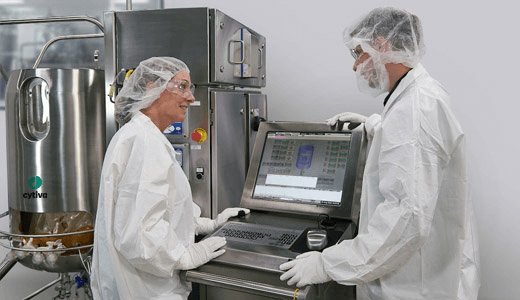To be successful in making targeted therapies, biopharma manufacturing must evolve into smaller, faster, and more efficient environments. Digital technology and data science can be leveraged to add flexibility and ease commercial scale-up.
Emmanuel Ligner is President & CEO at Cytiva. His goal is to ensure the organization’s vision, mission, and overall direction are aligned to help customers and partners develop and deliver important new therapies for patients. Learn more from Emmanuel at the BIO International Convention, June 3 to 6, 2019, in Philadelphia, booth #3519. If you would like to schedule an in-person meeting at BIO, please submit your request on our event page.
Digital: It’s the buzzword of today’s world. Partnering brings it to life.
I am absolutely convinced that digital technology is changing our company and the entire biopharma industry. Technology has been and will continue to be such an important enabler of all aspects of the business. Cytiva’s investment in digital stems from our corporate ancestry, as Cytiva has led efforts to realize the industrial internet. Our colleagues in aviation have been pioneers and we are learning from their experience.
Digitizing the biopharma and healthcare industry is one of our main priorities, and we’ve started on that journey by making investments and sparking collaborations with other industry leaders to see results quickly. Recently, we announced a collaboration with Rockwell Automation to drive next generation bioprocessing technology.

For example: We’re combining our own process and raw material data with our customers’ usage data to find ways to become more efficient in manufacturing. In the lab, we can use augmented reality to help researchers remotely see through stainless-steel doors and check connections. Through this relationship, we intend to help biopharmaceutical companies create flexible and scalable facilities of the future and a best-in-class automated distributed control system offering. In a different collaboration with Amgen, we’re using data to push toward improving products and processes.
Many biopharma companies are also exploring a variety of digital opportunities, including engaging patients with mobile apps and modernizing operations with artificial intelligence. A greater use of technology to interpret and connect data will surely help transform the discovery, development, and manufacturing processes that biopharma once knew. In the major shift toward precision medicines, these advances will make drug companies more competitive in an increasingly fast-paced market.
Digital equals efficiency
Simply put, manual processes slow down the decision-making process. Digital for biopharma is about productivity.
It is not hard to imagine or realize the benefits of digitizing paper processes such as batch records, capacity planning, detailed scheduling, and raw materials management. Using these digital tools and sharing data all the way through to hospitals’ clinical information systems will be especially crucial with time-sensitive personalized medicines, where rapid production turnaround is vital.
Bioprocessing operations can become more efficient with tools that can flag issues in advance, predict outcomes, and therefore help manufacturers make the right decisions in less time. Down the line, this could mean faster product releases, or rapid improvement where deviation is shown on performance of a batch.
In one case, our biopharma customer had been experiencing a drop in their production yields over four years–a very expensive problem when dealing with raw materials that can cost more than $1MM per batch. Leveraging Cytiva’s data analytics, better process parameters and raw material characteristics were identified for a high yield batch. We were able to make recommendations which helped recapture production yields and will also enable future data analysis to be delivered right on the production floor where decisions need to be made.
Coming back to speed
Let’s return to the topic of speed and efficiency and how digital can improve those factors for new drug development. Artificial intelligence trained on a huge amount of scientific data can predict new drug candidates with the highest probability of success—saving years formerly spent on trial-and-error experiments. Only via partnering can we both access and analyze data to get to useful recommendations. For example, pathway analysis of genome-wide data can improve dose prediction and clinical trial design. The agility afforded by technology has never been more important than with personalized medicines like cell and gene therapies, where flexibility, speed, and accuracy are essential. When scientists have on-demand access to all the relevant data, they can make decisions quicker and more efficiently, while reducing the risk of human errors and time-consuming re-work.
The time to start is now
We have a responsibility to do this, as well as help our customers and partners, so our site in Logan, Utah, is the center of our digital transformation. We are investing more than $5 million to drive rapid digital transformation for our entire business.
This Brilliant Factory is the home base for our collaboration with Amgen, which I mentioned earlier. I believe this partnership is another major breakthrough that pushes biomanufacturing further into the new digital age. Advanced data analytics will enable both Cytiva and Amgen to clearly understand, monitor, and control the effect of raw material variability on process performance during biopharmaceutical manufacturing. This way, both Cytiva and Amgen may drive huge product and process improvements, while advancing performance predictability and consistency. This is extremely important in reducing the potential of supply interruptions, safeguarding quality and regulatory demands, and increasing the speed to market, so that the biopharmaceuticals that save many lives always reach patients without delay.
The industry is increasingly capturing value from all sorts of data and creating digital ecosystems that have the potential to revolutionize patient care. To be successful in making targeted therapies, manufacturing must evolve into smaller, faster and more efficient environments. We cannot do it alone. Working together across industry, we can leverage digital technology and data science to reengineer key elements of the drug manufacturing process to add flexibility, efficiency, confidence, and importantly, ease commercial scale-up. Digitization of the biopharma industry will be essential to the way we advance healthcare and improve patient outcomes.